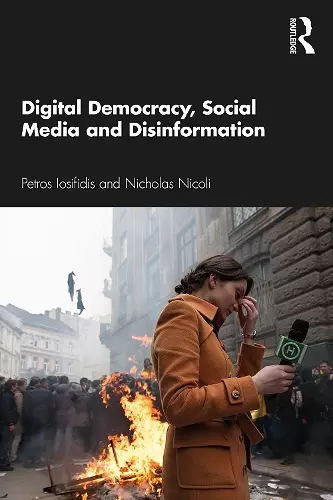Digital Democracy, Social Media and Disinformation
Petros Iosifidis author Nicholas Nicoli author
Format:Paperback
Publisher:Taylor & Francis Ltd
Published:31st Dec '20
Currently unavailable, and unfortunately no date known when it will be back
This paperback is available in another edition too:
- Hardback£145.00(9780367332082)

Digital Democracy, Social Media and Disinformation discusses some of the political, regulatory and technological issues which arise from the increased power of internet intermediaries (such as Facebook, Twitter and YouTube) and the impact of the spread of digital disinformation, especially in the midst of a health pandemic.
The volume provides a detailed account of the main areas surrounding digital democracy, disinformation and fake news, freedom of expression and post-truth politics. It addresses the major theoretical and regulatory concepts of digital democracy and the ‘network society’ before offering potential socio-political and technological solutions to the fight against disinformation and fake news. These solutions include self-regulation, rebuttals and myth-busting, news literacy, policy recommendations, awareness and communication strategies and the potential of recent technologies such as the blockchain and public interest algorithms to counter disinformation.
After addressing what has currently been done to combat disinformation and fake news, the volume argues that digital disinformation needs to be identified as a multifaceted problem, one that requires multiple approaches to resolve. Governments, regulators, think tanks, the academy and technology providers need to take more steps to better shape the next internet with as little digital disinformation as possible by means of a regional analysis. In this context, two cases concerning Russia and Ukraine are presented regarding disinformation and the ways it was handled.
Written in a clear and direct style, this volume will appeal to students and researchers within the social sciences, computer science, law and business studies, as well as policy makers engaged in combating what constitutes one of the most pressing issues of the digital age.
‘This is a wide-ranging book which gives valuable insights on emerging contemporary debates on digital democracy, social media and disinformation. The authors have dug deep into the underlying theories while never ignoring everyday empirical evidence. They engage with issues of policy and regulation which are now under scrutiny in democracies around the world. Their analysis is up to date, noting the impact of the digital platforms on disinformation on the COVID-19 pandemic. It is a necessary and timely text.’
Professor Leighton Andrews, Cardiff Business School, UK
‘The urgency of critical analysis of misinformation and fake news has become even more apparent in the context of COVID-19. Iosifidis and Nicoli offer a very nuanced analysis of this phenomenon from a socio-political perspective, recognising that the circulation of misinformation and conspiracy theories online is not simply a supply-side product of digital affordances, but is grounded in social phenomena such as the rise of populism. They are very much attuned to policy and regulatory issues, as well as technological options, that can address these urgent contemporary challenges.’
Professor Terry Flew, Queensland University of Technology, Australia
‘This book could not be more timely or relevant to the contemporary struggles with the effects of disinformation on society. The book explores why and how it poses dangers to democratic society and offers and reviews concrete solutions to them.’
Professor Robert G. Picard, Reuters Institute, University of Oxford, UK
ISBN: 9780367332105
Dimensions: unknown
Weight: 453g
156 pages